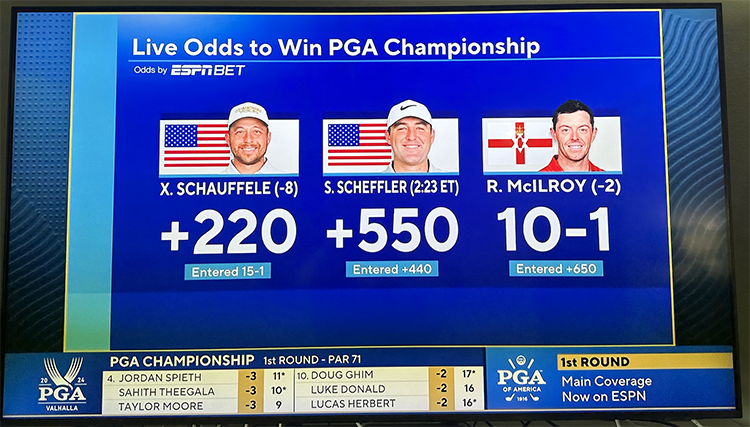7 Conflicts of Interest in Sports
Conflicts of interest surface throughout professional media. In this lesson, we’ll study conflicts of interest by focusing primarily on sports media. However, the case examples can serve as cautionary tales for decision-making far beyond athletics.

Before we dive into sports-specific examples, though, let’s consider the case of Superman (who no doubt would have been a world-class athlete if he had chosen to go that route instead of saving the world). In most media portrayals, Clark Kent works as a journalist who sometimes reports on his own heroic alter ego, Superman.
Journalists who report about themselves face an immediate conflict of interest. In Clark Kent’s case, is he less likely to include public criticism of Superman in his reporting? Will Clark Kent report important details that only Superman would know?
The potential conflicts of interest become even thornier in cases when Lois Lane, Clark Kent’s love interest and an award-winning journalist, interviews Superman.
Now let’s transition from a fictional superhero to an ESPN reporter.
Study the following presentation slides by using the forward button or clicking on sections of the control bar.
Here is additional perspective about the opening case study:
• ESPN’s Adam Schefter crosses a journalistic line – Poynter
The article included a key takeaway that journalists can verify specific information or direct quotes without sharing an entire story with a source:
Asking a source to clarify something is, of course, not only OK, but good journalism. That should be (and can be) done without showing the source what you wrote.
The University of Texas Center for Media Engagement published additional analysis:
WHAT IS A CONFLICT OF INTEREST?
A conflict of interest typically occurs when media professionals have a personal involvement, obligation or desire that clashes with their duties to an employer or the audience.
The section about independence in the NPR Ethics Handbook offers additional perspective:
Conflicts of interest come in many shapes — financial holdings, romantic relationships, family ties, book deals, speaking engagements, and others. It’s important to regularly review how our connections are entangled with the subjects of our reporting, and when necessary, to take action.
GAMBLING AND SPORTS REPORTING
In 2021, FanDuel, a sports betting website, paid an advertising fee to become the exclusive provider of sports odds in Associated Press sports reporting. According to an article from Axios, the Associated Press agreed to “cite FanDuel odds as a single source in its copy when referring to betting odds and will hyperlink out to FanDuel’s home page, not to any of its betting pages.”
And in November 2023, ESPN and a casino company, Penn Entertainment, launched a new brand called ESPN Bet.
As an example of how gambling and sports media have become entwined, below is a screenshot of an ESPN2 television broadcast of the 2024 PGA Championship. Fans could see live odds as the tournament unfolded.

By connecting content with gambling odds to enhance company revenue, the Associated Press and ESPN seem to be encouraging sports gambling. Thus, they benefit financially instead of maintaining a neutral stance on a controversial issue.
Sports gambling is still illegal in some states, partly because of concerns about gamblers becoming addicted. An essay in Bloomberg Opinion asked this question: “As gaming companies merge and sports leagues and media companies get in on the action, is anyone concerned about the dangers of gambling?”
To be fair, many major sports media outlets beyond the Associated Press and ESPN have similar arrangements to gain revenue from sports gambling sites. A New York Times analysis from 2024 cited research showing that NBA and NHL viewers “are exposed to three gambling ads a minute.” It said that commercial sports betting revenue increased 12-fold from 2019 to 2024.
Another media research study concluded that audiences for major televised sports events spend up to 20% of every game watching gambling advertising.
If you are contemplating a career in sports journalism or you are passionate about sports, you should read this in-depth historical analysis from Columbia Journalism Review:
• All In: How gambling swallowed sports media – CJR
The CJR article noted that sports reporters are sometimes the first to know about key injuries, coaching changes and lineup adjustments, or they may have inside information about a team’s game-day strategies. As gambling becomes more entwined with sports media coverage, “the opportunity for journalists to capitalize on behind-the-scenes access would seem irresistible.”
One analysis published by Harvard’s Nieman Journalism Lab, framed the question bluntly: Can reporters make bets on sports they cover? The article noted that there are few formal guidelines preventing sports journalists from using their inside information for financial gain.
And because many readers of this guidebook are college students, the following 2023 article seems relevant in this section. The Louisiana Illuminator explained why Louisiana State University and some other schools ended controversial advertising agreements with sports betting companies.
- LSU to fold on its controversial sports-betting deal with Caesar’s – Louisiana Illuminator
The article cited survey data from the NCAA indicating that “67% of on-campus students participate in sports betting.” On college campuses, this conflict of interest pits athletic department profit from advertising agreements against the financial and emotional well-being of some vulnerable students.
Media outlets may ponder whether they have an ethical duty to protect consumers from gambling ads, even with the accompanying loss of ad revenue. The Guardian, a prominent British newspaper with a global audience, announced in June 2023 that it would ban gambling ads, saying “it is unethical to take money from services that can lead to ‘addiction and financial ruin.'”
- The Guardian bans all gambling advertising – The Guardian
ENTERTAINMENT VS. JOURNALISM
Remember from our opening lesson that we discussed the dual nature of news media, which is the need to generate revenue by attracting a large audience while serving society with accurate information.
 We often observe this conflict of interest in sports media. ESPN wants to attract a large audience to its network so it can collect more advertising money. The programs and game broadcasts need to be entertaining without devaluing any journalistic authenticity.
We often observe this conflict of interest in sports media. ESPN wants to attract a large audience to its network so it can collect more advertising money. The programs and game broadcasts need to be entertaining without devaluing any journalistic authenticity.
Danyelle Musselman has an extensive background working in sports broadcasting as an anchor, host and reporter for the NFL Network, Yahoo Sports, Fox Sports and ESPN.
In the following audio, she said that “the majority of sports broadcasting lies right in the middle of entertainment and journalism.”
DOCUMENTARIES
Conflicts of interest are prevalent in documentary filmmaking as well. An article in Columbia Journalism Review suggested that documentary filmmakers often do not follow journalistic standards.
• Television is making more documentaries than ever – but skipping the journalism – CJR
In this CJR article, one sports example of a conflict of interest involves the release of The Last Dance in 2020. Michael Jordan granted access to archived off-court footage “on the condition that he could decide when, if ever, amazing shots of his airplane card games and tirades at practice could be released.”
In this case, the featured personality in the documentary had extensive control over the film’s content. To what extent could this have affected the truthfulness of the product? A documentary that uses only approved footage can become more like a PR project instead of an authentic portrayal of events.
In a previous lesson, we studied how executives may exercise prior review and approve content for PR stories. Note how a similar process can emerge for celebrities and other public figures who are given the opportunity to approve or reject footage in documentaries.
CLOSING REMINDER
Although this lesson relies on sports-related case examples, you can find similar conflicts of interest from across the media spectrum. As a closing non-sports example from 2022, the Online News Association partnered with the 3M company to create the 3M Truth in Science Award. The following summary explained the conflict of interest:
• For Online News Association, the thorny ethics of partnering with 3M – Harvard’s Nieman Lab
The article noted that “for decades, 3M withheld evidence from regulators and the public showing that chemicals known as per- and polyfluoroalkyl substances (PFASs) in some of its products accumulated in the environment and people’s bloodstreams with potentially toxic effects.”
Thus, a company that sponsored an award for truth in science reporting may not have always been truthful in its own disclosures to the public. This perhaps made the award more of a PR image-reclamation campaign for 3M rather than a sincere initiative for truthful science reporting.
CLOSING REVIEW
WRITE ABOUT IT
Write approximately four or five sentences for each response. When possible, strengthen your responses with brief supporting content from this chapter.
1. Based on the IAE guidelines in the previous lesson, is the Associated Press’ arrangement with FanDuel an ethical advertising partnership? If you worked for the Associated Press, what concerns would you have for overseeing the actual implementation of the agreement.
• Principles and Practices – Institute for Advertising Ethics
2. Is it a conflict of interest for a sports journalist to make a gambling wager based on information gained while reporting, or is that insider information just a new perk of the profession with minimal ethical concerns?
3. How would you characterize the fallout from the case study involving ESPN’s Adam Schefter? Do you think it was an ethical lapse that only interested journalists, or did it erode ESPN’s reputation because viewers will be less likely to trust future reporting?
4. To what extent does a documentary film’s credibility suffer if it relies on footage approved by the film’s subjects? How could this affect an audience’s perception of journalism?
5. We’ll step out of the sports realm for the last question. Let’s pretend you write for Macworld, which is an actual online site and digital magazine covering Apple computer news and products (iPhones, iPads, Macintosh computers, Apple TV, software, hardware, audio, etc.). Explain any potential conflicts of interest you need to keep in mind when you write a product review. These can be conflicts of interest for you as a writer or conflicts of interest that your audience is likely to assume about Macworld content.

